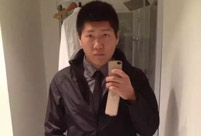

Joseph Jimenez(R), CEO of Novartis, says that the company is working on five cancer types including breast, hematology, kidney, lung and melanoma at the World Medical Innovation Forum on April 27. (People’s Daily Online/Han Shasha)
Today, cancer accounts for about 1 in every 7 deaths worldwide, according to America Cancer Society. World Health Organization predicted that new cancer-related cases and deaths worldwide will increase to 22 million cases and 13 million deaths by 2030.
Cancer has become an increasingly prominent topic worldwide: various cancer types, painful treatment process, high medical prices and other concerning topics call for not only attentions, but also innovations and solutions from the medical industry.
More than 1000 clinicians, scientists, executives, and investors gathered from April 25 and April 27 in Boston at the World Medical Innovation Forum discussing and exploring emerging cancer innovations in immunotherapy, epigenetic, early diagnosis, combination therapies, curative drugs, and others.
Joseph Jimenez, CEO of the Swiss pharmaceutical company Novartis, said at the forum that the company is now focusing primarily on cancer types like breast, hematology, kidney, lung and melanoma. Jimenez said that certain cancer becomes chronic disease because of technology advance. “We have to be part of that, and we have to drive that because technologies are fingertips that our predecessors never have.” And Novartis has put most of its effort behind a cell-based immunotherapy known as CAR-T. It is known that Novartis invested $8.9 billion on R&D in 2015.
Immunotherapy was a frequently mentioned term at the forum, which is considered to bring next breakthrough in cancer treatment by attendees. Immunotherapy, or biologic therapy, is a type of cancer treatment designed to boost the body's natural defenses to fight the cancer. It uses materials either made by the body or in a laboratory to improve, target, or restore immune system function.
Marcela Maus, director of Cellular Immunotherapy, MGH Cancer Center and assistant professor of Medicine, Harvard Medical School said that immunotherapy is a complicated technology that has been developed for 15 to 20 years. The problem is how to apply it worldwide.
Cancers are mainly treated with surgery, chemotherapy, radiation therapy or combination now. Patients suffer from pains both from their bodies and the procedures. What makes immunotherapy different? Bruno Strigini, president of Novartis Oncology, explained “in one word, how to boost your own immune system to fight against cancer.” He introduced that Novartis is conducting early study in immunotherapy.
However, immunotherapy is not the whole picture of cancer treatment. Early detection, precise medicine, and combined therapy are also needed for cancer treatment. Strigini told the reporter that Novartis revolutionized cancer treatment 15 years ago with the launch of Gleevec. Gleevec identified and tackled the gene default. “For the first time, we are addressing a clearly defined default gene. That makes what we are today as the second largest company in the oncology.” “How to use your system in order to tackle cancer, there are many ways in which you can address this.” He also explained that patients may have medicine resistance after rounds of treatments, “We can use our own medicines for combination treatment.” He said that the checkpoint inhibitors targeting PD-1 the company now working on is one of its product pipelines. Owning broad pipelines is the company's advantage compared to other competitors.
Although immunotherapy is considered future of cancer treatment with great market potential, how to balance the prices and affordability is an inevitable issue. Data from America Cancer Association show that direct medical expenditure on cancer reaches 88.7 billion U.S. Dollars. Compared with the sophisticated healthcare system in the United States, the spending might be even higher in some other countries. Hundreds of millions investments and unexpected failures facing pharmaceutical companies makes it impossible to lower the prices, while patients may struggle to deal with surging high prices. Good solutions to balance prices and affordability have not yet been found.
At the forum, 12 most disruptive technologies that will have the greatest impact on cancer were also announced, which are cellular immunotherapy, immune modulators and vaccines, liquid biopsy for oncology, machine learning and computational biology to transform cancer care, epileptics and cancer treatment, the micro biome and cancer, CRISPR: genome editing and cancer, single-cell molecular profiling, mHealth and cancer care, patient-specific research to enable efficient drug development, redefining value in cancer care and nanotechnology and cancer treatment.
 French girl ties the knot with Chinese boy
French girl ties the knot with Chinese boy Beijing Style: ready for bare legs
Beijing Style: ready for bare legs Century-old station sees railyway evolution
Century-old station sees railyway evolution Enthusiasts perform Kung Fu at Wudang Mountain
Enthusiasts perform Kung Fu at Wudang Mountain Stunning photos of China's fighter jets in drill
Stunning photos of China's fighter jets in drill Monk's mummified body to be made into a gold Buddha statue
Monk's mummified body to be made into a gold Buddha statue Former Chinese solider of the French Foreign Legion seeks wife online
Former Chinese solider of the French Foreign Legion seeks wife online Asia's longest and highest suspension bridge to open to traffic
Asia's longest and highest suspension bridge to open to traffic China's first interactive robot looks like a beauty
China's first interactive robot looks like a beauty Top 20 hottest women in the world in 2014
Top 20 hottest women in the world in 2014 Top 10 hardest languages to learn
Top 10 hardest languages to learn 10 Chinese female stars with most beautiful faces
10 Chinese female stars with most beautiful faces China’s Top 10 Unique Bridges, Highways and Roads
China’s Top 10 Unique Bridges, Highways and Roads Hong Kong opposition should seize the moment
Hong Kong opposition should seize the moment Trump’s anti-immigrant rhetoric strikes a chord with Chinese Americans
Trump’s anti-immigrant rhetoric strikes a chord with Chinese Americans China rejects latest US steel measures
China rejects latest US steel measures Is the wage gap between expats and locals a function of the market – or plain old discrimination?
Is the wage gap between expats and locals a function of the market – or plain old discrimination?Day|Week